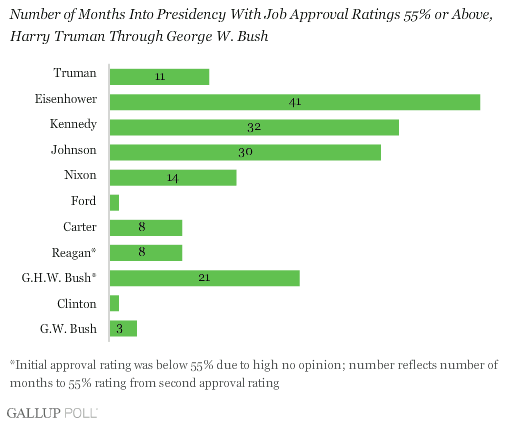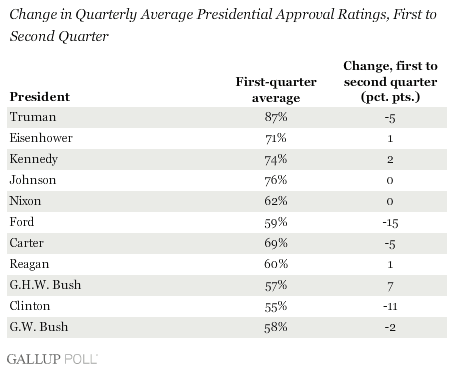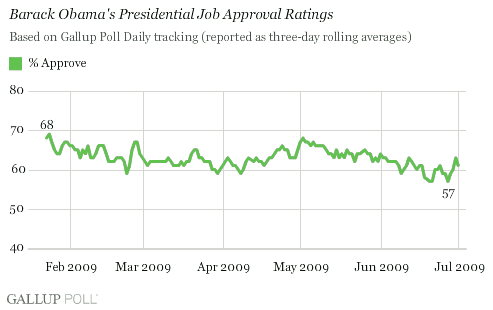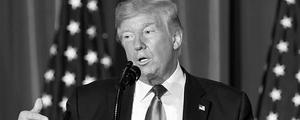PRINCETON, NJ -- Presidents typically enjoy positive approval ratings during the early stages of their presidencies, commonly known as the "honeymoon" period. Barack Obama is no exception, with ratings that have generally been above 60%. But recent presidents' honeymoons have typically ended much sooner than those of their predecessors. Whereas presidents from Harry Truman through Richard Nixon spent an average of 26 months above the historical average 55% presidential job approval rating after they took office, presidents from Gerald Ford to George W. Bush spent an average of just seven months above this norm.

Using this standard, each president from Truman to Nixon had a honeymoon that lasted at least into his 10th month in office. This includes popular presidents such as Dwight Eisenhower, who did not drop to 55% approval until his fourth year in office, and John Kennedy, who never did, but bottomed out at 56% in September 1963, his 32nd month in office (for the purposes of this article, this 56% rating is considered the end of his honeymoon).
But only one of the last six presidents -- George H.W. Bush -- had a honeymoon that extended beyond his ninth month in office. Bush's ratings actually climbed for much of his first year and a half in office as the economy remained strong, several communist regimes fell in Europe, and the U.S. military was able to capture Panamanian dictator Manuel Noriega and remove him from power.
One reason earlier presidents had longer honeymoons is because they enjoyed much greater public support in the early part of their presidencies. The five presidents from Truman to Nixon averaged 74% job approval in their first quarters in office, compared with a 60% average for presidents from Ford through George W. Bush.
But the earlier presidents were able to maintain their lofty ratings well into their second quarter; only Truman was unable to maintain or improve upon his first-quarter average approval rating in his second quarter in office. This group includes Nixon, who had a lengthy honeymoon despite starting out with initial ratings near 60% -- similar to what more recent presidents have had.
The six presidents from Ford to George W. Bush were not as successful in maintaining or increasing their average ratings from the first to the second quarter; only Ronald Reagan and the elder Bush were able to do so. Ford and Bill Clinton in particular showed rather steep declines during their second quarters in office. Ford's decline was largely the result of his unpopular decision to pardon Nixon for his role in the Watergate scandal. Clinton's was the result of a series of early missteps in filling key administration positions, controversy over his attempt to revise military policy toward gays, and the public relations nightmare that resulted from his tying up runway traffic at Los Angeles International Airport to receive a high-priced haircut aboard Air Force One.

The Obama Honeymoon
Obama's initial approval rating was 68%, generally higher than what other recent presidents had at the beginning of their terms. He averaged 63% for his first quarter in office.
Now well into his second quarter as president, his approval rating has stayed above 60% for the most part, but he has had a number of ratings in the 50s, including a low of 57% three times in Gallup Poll Daily tracking.

Because Obama has been able to maintain above-average approval ratings, he is arguably still in the honeymoon phase of his presidency. Now in his sixth month in office, his honeymoon has already exceeded the durations of those for Ford, Clinton, and George W. Bush. If he can maintain ratings above 55% through the summer, his honeymoon will match the length of those for Jimmy Carter and Reagan.
Obama's continuing honeymoon could be considered impressive, given that few of his predecessors faced such trying economic and international conditions upon taking office. He has taken swift action to pass legislation to help improve the economy, but soon Americans will be looking for results and will hold him accountable if they are not there. Meanwhile, he is turning his attention to his domestic agenda -- most notably in trying to reform the U.S. healthcare system -- while trying to respond to the international situations that affect U.S. interests and security, including in Iraq, Afghanistan, Iran, and North Korea. His ability to successfully address these challenges will ultimately determine how long his honeymoon lasts.
Survey Methods
Results are based on polls of 1,000 or more randomly selected national adults, aged 18 or older, conducted by Gallup from 1945-2009. Polls from 1945-1989 were conducted mostly in person, and polls from 1990-2009 were conducted mostly by telephone. Each poll has a margin of sampling error of no less than ±3 percentage points.
